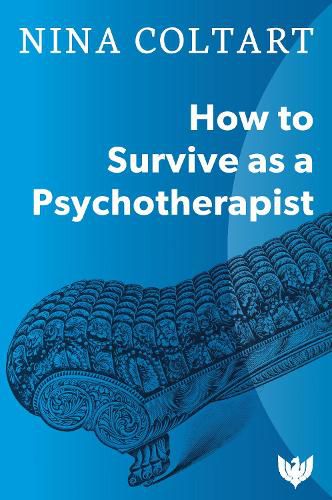Readings Newsletter
Become a Readings Member to make your shopping experience even easier.
Sign in or sign up for free!
You’re not far away from qualifying for FREE standard shipping within Australia
You’ve qualified for FREE standard shipping within Australia
The cart is loading…






A classic work from Nina Coltart revitalised with a brand-new foreword by David E. Scharff with down-to-earth advice on how to run a practice, the pleasures ? and pains ? of psychotherapy, vivid clinical stories of success and failure, and discussion on the work/life balance. This book is for all psychotherapists, trainees, and those with an interest in therapy. Nina Coltart's classic work, How to Survive as a Psychotherapist, was written over a quarter of a century ago and yet still resonates today with sage advice for the aspiring and established psychotherapist. This reissue contains a new Foreword from celebrated psychoanalyst David E. Scharff and an updated Further Reading section. Not simply a "how to" manual, this compact book is an amalgam of down-to-earth practicality about assessment, the pleasures of psychotherapy as opposed to analysis, details of how to run a practice, vivid clinical stories which don't necessarily turn out well, discussions of Buddhism, and an autobiographical finale on the balance between life and work, including Coltart's choice to live alone. Written in deceptively simple language, it reads easily and encourages beginners, but its backbone is the accrued wisdom for a career containing "survival-with-enjoyment" that offers new perspectives to both mid-career and experienced therapists and teachers. The professional autobiographical quality of the book reveals a lot about Coltart: her love of psychotherapy over full analysis and the number of strictures in analysis that she feels bind rather than guide. She describes the first years, in training and beyond, as full of anxiety: trying to get things right whilst an inner critical voice and the judgement of supervisors and teachers hangs over it all. Slowly, as time goes by, the ability to relax into a career with confidence in one's own voice, knowledge, and intuition leads to a capacity for enjoyment of what can seem to outsiders a grim profession dealing only with suffering. Coltart's book celebrates psychotherapy and its practitioners, and is full of interesting and practical advice that both experienced and novice psychotherapists will find invaluable. This enduring classic has stood the test of time and should be a feature of every aficionado's bookshelf. AUTHOR: Nina Coltart was "one of the most admired and liked psychoanalysts in Britain. For 35 years she was an active member of the British and international psychoanalytic community and she played a major role in extending the influence of analytic ideas outside that world." (A. H. Brafman, "Obituary: Nina Coltart", Independent, 18 August 1997)
$9.00 standard shipping within Australia
FREE standard shipping within Australia for orders over $100.00
Express & International shipping calculated at checkout
A classic work from Nina Coltart revitalised with a brand-new foreword by David E. Scharff with down-to-earth advice on how to run a practice, the pleasures ? and pains ? of psychotherapy, vivid clinical stories of success and failure, and discussion on the work/life balance. This book is for all psychotherapists, trainees, and those with an interest in therapy. Nina Coltart's classic work, How to Survive as a Psychotherapist, was written over a quarter of a century ago and yet still resonates today with sage advice for the aspiring and established psychotherapist. This reissue contains a new Foreword from celebrated psychoanalyst David E. Scharff and an updated Further Reading section. Not simply a "how to" manual, this compact book is an amalgam of down-to-earth practicality about assessment, the pleasures of psychotherapy as opposed to analysis, details of how to run a practice, vivid clinical stories which don't necessarily turn out well, discussions of Buddhism, and an autobiographical finale on the balance between life and work, including Coltart's choice to live alone. Written in deceptively simple language, it reads easily and encourages beginners, but its backbone is the accrued wisdom for a career containing "survival-with-enjoyment" that offers new perspectives to both mid-career and experienced therapists and teachers. The professional autobiographical quality of the book reveals a lot about Coltart: her love of psychotherapy over full analysis and the number of strictures in analysis that she feels bind rather than guide. She describes the first years, in training and beyond, as full of anxiety: trying to get things right whilst an inner critical voice and the judgement of supervisors and teachers hangs over it all. Slowly, as time goes by, the ability to relax into a career with confidence in one's own voice, knowledge, and intuition leads to a capacity for enjoyment of what can seem to outsiders a grim profession dealing only with suffering. Coltart's book celebrates psychotherapy and its practitioners, and is full of interesting and practical advice that both experienced and novice psychotherapists will find invaluable. This enduring classic has stood the test of time and should be a feature of every aficionado's bookshelf. AUTHOR: Nina Coltart was "one of the most admired and liked psychoanalysts in Britain. For 35 years she was an active member of the British and international psychoanalytic community and she played a major role in extending the influence of analytic ideas outside that world." (A. H. Brafman, "Obituary: Nina Coltart", Independent, 18 August 1997)